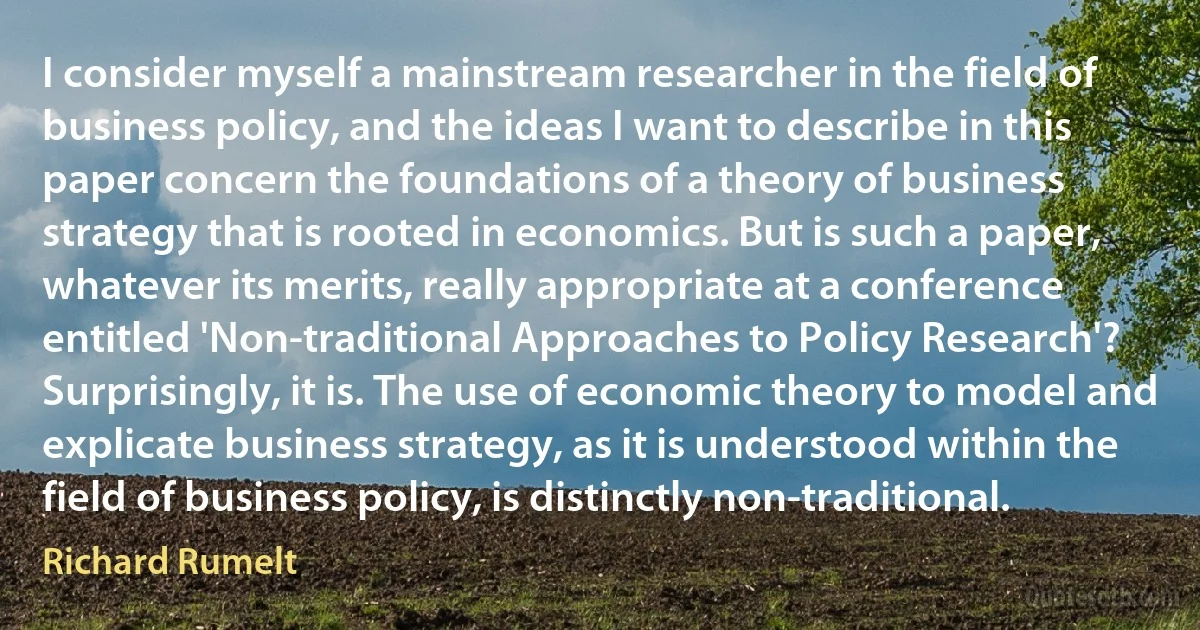Richard Rumelt quotes
Having conflicting goals, dedicating resources to unconnected targets, and accommodating incompatible interests are the luxuries of the rich and powerful, but they make for bad strategy. Despite this, most organizations will not create focused strategies. Instead, they will generate laundry lists of desirable outcomes and, at the same time, ignore the need for genuine competence in coordinating and focusing their resources. Good strategy requires leaders who are willing and able to say no to a wide variety of actions and interests. Strategy is at least as much about what an organization does not do as it is about what it does.

Richard Rumelt
Given that background, I was interested in what Steve Jobs might say about the future of Apple. His survival strategy for Apple, for all its skill and drama, was not going to propel Apple into the future. At that moment in time, Apple had less than 4 percent of the personal computer market. The de facto standard was Windows-Intel and there seemed to be no way for Apple to do more than just hang on to a tiny niche.
In the summer of 1998, I got an opportunity to talk with Jobs again. I said, "Steve, this turnaround at Apple has been impressive. But everything we know about the PC business says that Apple cannot really push beyond a small niche position. The network effects are just too strong to upset the Wintel standard. So what are you trying to do in the longer term? What is the strategy?"

Richard Rumelt
Back in the mid-1990s I was researching strategy in the global electronics industry. I interviewed 20 to 30 executives, CEOs, and division managers and asked fairly simple questions. Which company was the leader in their market? How did that company become the leader? What's their own company's strategy?
I saw an interesting pattern. Most executives easily explained how companies became market leaders: Some sort of window of opportunity opened, and the leader was the company that was the first to successfully jump through that window. Not exactly the first mover but the first to get it right.
But when I asked these same executives about their own strategies, I heard a lot about doorknob polishing. They were doing 360-degree feedback, forming alliances, outsourcing, cutting costs, and so on. None of them even mentioned taking a good position quickly when the industry changes.

Richard Rumelt
When organizations are unable to make new strategies - when people evade the work of choosing among different paths in the future - then you get vague mom-and-apple-pie goals everyone can agree on. Such goals are direct evidence of leadership's insufficient will or political power to make or enforce hard choices.

Richard Rumelt
Despite the roar of voices wanting to equate strategy with ambition, leadership, "vision,” planning, or the economic logic of competition, strategy is none of these. The core of strategy work is always the same: discovering the critical factors in a situation and designing a way of coordinating and focusing actions to deal with those factors.

Richard Rumelt
Some of the biggest changes have been in the process of generating business strategies-what I call "strategy work.” Around 1980, the received wisdom was to decentralize into business units, which would each generate a strategic plan. These plans were then amalgamated up the hierarchy, in some portfolio way, for senior management. That approach has all but disappeared, and we've seen a dramatic recentralization of strategy work.

Richard Rumelt
Then, in 1998, I had the chance to talk with Steve Jobs after he'd come back and turned Apple around. I was there to help Telecom Italia try to do a deal with Apple, but after that business was completed I couldn't help asking a question. "Steve,” I said, "this turnaround at Apple has been impressive. But everything we know about the personal-computer business says that Apple will always have a small niche position. The network externalities are just too strong to upset the de facto "Wintel” standard. So what are you trying to do? What's the longer-term strategy?”
He didn't agree or disagree with my assessment of the market. He just smiled and said, "I am going to wait for the next big thing.”.

Richard Rumelt
This study partitions the total variance in rate of return among FTC Line of Business reporting units into industry factors (whatever their nature), time factors, factors associated with the corporate parent, and business-specific factors. Whereas Schmalensee (1985) reported that industry factors were the strongest, corporate and market share effects being extremely weak, this study distinguishes between stable and fluctuating effects and reaches markedly different conclusions. The data reveal negligible corporate effects, small stable industry effects, and very large stable business-unit effects. These results imply that the most important sources of economic rents are business-specific; industry membership is a much less important source and corporate parentage is quite unimportant.

Richard Rumelt
Prior work has shown an association between diversification strategy and profitability. This paper replicates that association using more recent and complete data and goes on to investigate the sources of the association. Theoretical arguments are advanced which predict the association which will remain once the effects of varying industry profitability are removed. Empirical tests verify this prediction and permit the discrimination between the effects of industry and diversification strategy on profitability.

Richard Rumelt
Nelson's challenge was that he was outnumbered. His strategy was to risk his lead ships in order to break the coherence of his enemy's fleet. With coherence lost, he judged, the more experienced English captains would come out on top in the ensuing melee. Good strategy almost always looks this simple and obvious and does not take a thick deck of PowerPoint slides to explain. It does not pop out of some "strategic management" tool, matrix, chart, triangle, or fill-in-the-blanks scheme. Instead, a talented leader identifi es the one or two critical issues in the situation-the pivot points that can multiply the effectiveness of effort-and then focuses and concentrates action and resources on them.

Richard Rumelt


![[ Diversification strategy is] a firm's commitment to diversity per se, together with the strengths, skills or purposes that span this diversity, shown by the way in which business activities are related one to another. (Richard Rumelt)](https://cdn.quotesdtb.com/img/quotes_images_webp/25/richard-rumelt-business-commitment-960425.webp)

